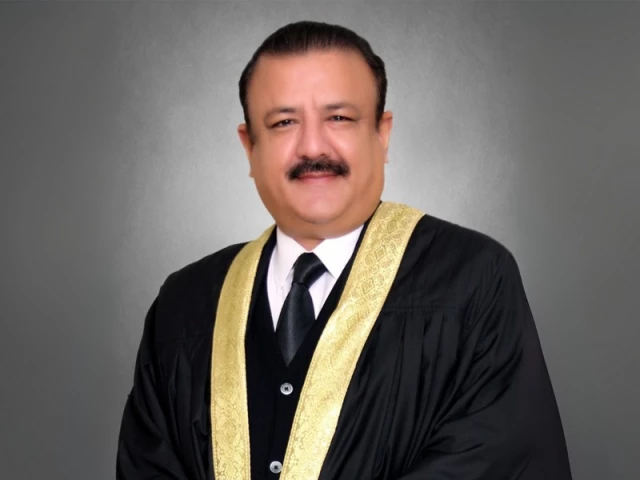The Sindh High Court (SHC) has suspended University of Karachi’s decision to cancel the degree of Islamabad High Court (IHC) judge Tariq Mehmood Jahangiri.
A two-member bench led by Justice Muhammad Iqbal Kalhoro heard the petition against the degree cancellation. Sindh Advocate General Jawad Dero, KU Registrar Professor Imran Siddiqui, and other officials were present at the hearing.
The registrar apprised the court that the university had received notice “only two days earlier” and requested time to file a reply.
The petitioner’s counsel, Barrister Salahuddin, sought more time from the bench to respond while seeking cancellation of the varsity’s order in the meantime.
“How much time do you need? If action is taken against the petitioner during this period, who will compensate for the loss? If the order is later reversed, who will be responsible? This involves a man’s lifetime of work. Was notice even served to the affected party?” the bench asked the registrar.
Read: Paying price of judicial independence: Jahangiri
Siddiqui replied that he had been newly appointed as registrar and was unaware of the case history.
This irked the bench further. “If you are in court, you must provide answers. It may be that the action was driven by personal interest. Questions are being raised over his degree. Even if someone files a petition 30-35 years later, the affected person should be heard. We are not saying action cannot be taken, but a person’s honour cannot be put at stake.”
Justice Kalhoro added that judicial decisions passed without hearing both sides carried little weight. “Ex-parte judgments are not considered good judgments.”
The bench suspended KU’s notification and restrained the varsity from taking further action based on the Syndicate and Unfair Means Committee’s recommendations. The next hearing is slated for October 24.
‘Fictitious degree’
KU had declared Jahangiri’s LLB degree “fictitious” after its Unfair Means Committee concluded he had never been enrolled at Islamia Law College and had engaged in malpractice during his LLB exams in the 1980s.
KU Syndicate endorsed the findings, which later became the basis of a complaint now pending before the Supreme Judicial Council (SJC).
‘Mala fide intent’
Justice Jahangiri maintains that the cancellation was “illegal” and “mala fide”, claiming it violated principles of natural justice as he was not given notice before the decision. He also contends that the move amounts to political victimisation, linking it to previous instances of him asserting judicial independence.
Jahangiri has referred to a letter he signed in March 2024 against surveillance of judges and his work as a judge on an election tribunal, which upset the ruling party’s candidates by its decisions, as examples of such instances.
Read More: SC sets aside order restraining IHC Judge Jahangiri
Earlier, on September 16, a divisional bench of the IHC, led by Chief Justice Sardar Muhammad Sarfraz Dogar, restrained Justice Jahangiri from performing judicial work as it took up proceedings on a quo warranto petition challenging the validity of his LLB degree.
Three days later, on September 19, Justice Jahangiri, along with four other IHC judges, filed separate constitutional petitions before the Supreme Court, seeking to quash IHC’s restraining order.
On September 25, KU formally cancelled his LLB degree, citing the Syndicate’s previous decision.
Also Read: IHC’s Jahangiri petitions SC in degree case
Justice Jahangiri then approached SHC challenging the maintainability of the proceedings and highlighting that he had not been formally impleaded or given notice.
During the hearing, his counsel staged a walkout much to the annoyance of SHC bench. “Such conduct is highly deprecated,” the bench observed, warning that it could constitute contempt of court.
On September 30, a five-member constitutional bench of the Supreme Court, headed by Justice Aminuddin Khan, suspended the IHC order that had barred Jahangiri from judicial work.
The top court stressed that a judge could not be restrained from performing duties through an interim order and noted that only the Supreme Judicial Council (SJC) has authority to act against a sitting judge.
Justice Jahangiri’s judicial duties were restored but limited to single and divisional benches.
Most recently, on October 3, Justice Jahangiri filed a petition before the Supreme Court against the SHC ruling that dismissed his plea to become a party in the fake degree case.
The petition contended that the SHC passed an ex-parte judgment without hearing the aggrieved party and named 10 institutions, including KU and the Sindh Higher Education Commission, as respondents.
Senior lawyer Faisal Siddiqui questioned how the SHC could rule on maintainability without first hearing the aggrieved party, while Jahangiri’s counsel, Munir A Malik, argued that only the SJC has constitutional authority to take action against a sitting judge. Malik further underscored that cancelling a degree after 34 years was “unprecedented”.
The appex court is due to review the maintainability of the petitions as well as the procedures adopted by both KU and SHC. Lawyers say the outcome could have far-reaching implications for judicial independence and the process of adjudicating complaints against sitting judges.

